Have you ever stopped to consider the origins of our most fundamental ideas about existence, morality, and governance? The answers often lead back to the sun-drenched city-states of ancient Greece, a crucible of intellectual ferment where a remarkable assembly of thinkers dared to question the conventional wisdom of their time. These intellectual giants meticulously laid the very bedrock for much of Western philosophy, science, and political thought. This journey is not merely an academic exercise; it is an exploration of how humanity first learned to think critically, challenge ingrained assumptions, and relentlessly pursue truth. From the audacious inquiries into the universe’s fundamental composition to Socrates’ pivotal shift toward human ethics, and the monumental systems built by Plato and Aristotle, we will trace the evolution of thought. We will then examine the Hellenistic philosophers who distilled these grand ideas into practical frameworks for living a virtuous life. Prepare to discover how these ancient debates continue to echo powerfully in our complex modern world, offering timeless insights into the human condition. This overview of Greece’s past provides a helpful background.
The Dawn of Rational Inquiry: Pre-Socratic Pioneers and the Cosmos
The genesis of ancient Greek philosophy lies with the Pre-Socratics, a diverse and intellectually vibrant group of thinkers active primarily during the 6th and 5th centuries BCE. Unlike their later counterparts, their primary fascination lay not with human ethics or political structures, but with cosmology—the rigorous study of the universe’s origin, nature, and underlying principles. These pioneering attempts to explain the natural world, while often conceptual and rudimentary by contemporary scientific standards, represented a monumental leap. They marked a profound paradigm shift away from mythological or divine explanations and towards a nascent form of rational inquiry and empirical observation.
Thales of Miletus (c. 624–546 BCE), often rightfully hailed as the “father of Western philosophy,” inaugurated this new era by positing that water was the primordial arche—the fundamental substance from which all things originated. His bold assertion, though seemingly simplistic, was revolutionary because it sought a natural, rather than supernatural, explanation for existence. Thales is also credited with significant contributions to mathematics and astronomy, notably predicting a solar eclipse and applying geometric principles.
His student, Anaximander (c. 610–546 BCE), went a step further, proposing that the universe stemmed from the “apeiron”—an unlimited, indefinite, and eternal substance that encompassed all opposites and from which all things emerged. Anaximander’s attempt to define a boundless, non-observable source demonstrated a move toward greater abstraction. Anaximenes (c. 585–528 BCE), another Milesian, identified air as the primary element, arguing that through processes of rarefaction and condensation, air transformed into fire, wind, clouds, water, earth, and stone. What truly set these early thinkers apart and influenced the very foundation of scientific thought? Their systematic, albeit speculative, approach to explaining natural phenomena without resorting to divine intervention was unprecedented and profoundly revolutionary.
Heraclitus of Ephesus (c. 535–475 BCE), famously known as “The Obscure” due to his enigmatic aphorisms, introduced the profound doctrine of perpetual flux. His most enduring statement, “No man ever steps in the same river twice,” eloquently encapsulates his belief in the ever-changing nature of reality. Heraclitus emphasized the constant process of becoming and passing away, identifying fire as the archetypal element symbolizing this ceaseless transformation. He also introduced the concept of Logos, an underlying rational principle or cosmic law governing the universe’s order amidst its constant change, a concept that would profoundly influence later Stoic philosophy.
In stark philosophical opposition stood Parmenides of Elea (c. 515–450 BCE). He vehemently argued that true reality is singular, unchanging, eternal, and indivisible, accessible only through immutable reason. Parmenides sharply differentiated between the “way of truth,” reachable through rigorous logical deduction, and the “way of opinion,” which he deemed unreliable as it was based on fallible sensory perception. His student, Zeno of Elea (c. 490–430 BCE), formulated a series of perplexing paradoxes (like the famous Achilles and the Tortoise) specifically designed to demonstrate the absurdity of motion and plurality, thus further bolstering Parmenides’ monistic view that reality is a singular, unchanging whole.
In a surprisingly modern leap, Democritus (c. 460–370 BCE), along with his teacher Leucippus, proposed that everything in the universe is composed of tiny, imperceptible, indivisible particles called atoms, moving eternally in empty space. This atomic theory was astonishingly prescient for its era, laying conceptual groundwork that would not be fully appreciated until the advent of modern science centuries later. Democritus also advocated for a life of “cheerfulness” or euthymia, achieved through moderation and the pursuit of knowledge. These early philosophers, despite their differing views, collaboratively set the intellectual stage for subsequent profound inquiries into the nature of being, the acquisition of knowledge, and the fundamental fabric of reality.
| Philosopher | Key Idea | Influence/Relevance |
|---|---|---|
| Thales | Water as the fundamental substance; sought natural explanations. | Pioneered rational inquiry, first Western philosopher, contributions to geometry and astronomy. |
| Anaximander | “Apeiron” (the boundless, undefined) as the origin of all things. | Advanced abstract thought, first to write a philosophical treatise, early cosmologist. |
| Anaximenes | Air as the primary element, transforming through rarefaction and condensation. | Refined Milesian school, attempted a systematic explanation of change. |
| Heraclitus | “Everything flows” (perpetual flux); reality is constant change governed by Logos. | Influenced Plato and Stoics, emphasized dynamism and unity of opposites. |
| Parmenides | Reality is unchanging, singular, and eternal, accessible only by reason. | “Father of Metaphysics,” laid groundwork for formal logic, challenged sensory perception. |
| Zeno of Elea | Paradoxes (e.g., Achilles and the Tortoise) to demonstrate the illusory nature of motion and plurality. | Stimulated logical thinking, influenced mathematics (calculus), defended Parmenides’ monism. |
| Democritus | Atomic theory: universe composed of tiny, indivisible atoms moving in a void. | Astoundingly prescient scientific concept, earliest materialist philosopher, contributed to ethics. |
Socrates: The Moral Compass and the Unexamined Life
Socrates (c. 470–399 BCE) fundamentally reshaped the trajectory of Greek philosophy, marking an unparalleled turning point. Imagine a life devoted entirely to questioning: challenging every assumption, dissecting common beliefs, and compelling others to confront their own ignorance. This was precisely the life of Socrates, who pivoted philosophical inquiry from the cosmological speculations of the Pre-Socratics to profound ethical and epistemological concerns. He famously claimed to know nothing, yet dedicated his existence to engaging Athenian citizens from all walks of life in probing discussions, all in a relentless pursuit of wisdom and virtue.
His signature method, known as the Socratic method or elenchus, involved a disciplined process of asking a series of incisive questions to expose contradictions in his interlocutors’ beliefs. This rigorous intellectual exercise was designed not to humiliate, but to lead individuals to self-awareness and prompt them to critically re-examine their deeply held, often unexamined, assumptions, thereby arriving at clearer, more reasoned conclusions. Socrates firmly believed that virtue is knowledge, arguing that wrongdoing stems primarily from ignorance rather than malicious intent. To act morally, one must first understand what is good.
Socrates’s unwavering commitment to truth, his relentless pursuit of self-knowledge, and his uncompromising adherence to moral principles ultimately rendered him a profoundly controversial figure in Athens. His critiques of conventional morality and his influence on the youth led to his infamous trial and eventual execution in 399 BCE on charges of impiety and corrupting the young. Though Socrates himself wrote nothing, his groundbreaking principles of critical thinking, moral integrity, and the paramount importance of self-knowledge were meticulously preserved and brilliantly developed by his most devoted student, Plato. Socrates’s challenging life and tragic death cemented his legacy, undeniably reshaping the very foundations of Western intellectual discourse and demonstrating the potent, often dangerous, power of philosophical inquiry.
Plato and Aristotle: Pillars of Western Thought
Socrates’s intellectual earthquake reverberated far beyond his own lifetime. His profound influence is most evident in the work of his student, Plato, who in turn became the teacher of Aristotle. Together, these three foundational figures form the indomitable cornerstone of Western philosophy, collectively shaping our most fundamental understandings of metaphysics, epistemology, ethics, and political philosophy.
Plato (c. 428–348 BCE), widely regarded as one of the most influential philosophers of all time, immortalized his teacher’s ideas through his eloquent dialogues, where Socrates often features as the central protagonist. However, Plato also developed his own unique and comprehensive philosophical system. He founded the Academy in Athens, an institution often cited as the first true university in the Western world, which served as a beacon of higher learning for centuries.
Central to Plato’s philosophy is his renowned Theory of Forms. This revolutionary concept posits that the visible, material world we perceive through our senses is merely an imperfect reflection, a “shadow,” of a higher, eternal, and immutable realm of perfect and ideal Forms. These Forms—such as perfect Justice, absolute Beauty, or ultimate Goodness—are the true, unchanging objects of genuine knowledge, while the physical objects we encounter are merely flawed, transient copies. Plato explored these profound ideas in depth across his numerous dialogues, most notably in his seminal work, The Republic. This magnum opus outlines his detailed vision of an ideal state, a just society governed by philosopher-kings and philosopher-queens—individuals who, through rigorous intellectual and moral training, have achieved a deep understanding of the Forms and are thus uniquely equipped to govern with wisdom and integrity. Plato’s dualistic view of reality, distinguishing between the ephemeral physical world and the eternal world of Forms, has profoundly influenced subsequent thought in religion, art, and science, igniting debates about the nature of reality for millennia.
Aristotle (384–322 BCE), a brilliant student at Plato’s Academy for nearly two decades and later the esteemed tutor to Alexander the Great, eventually established his own influential school in Athens, the Lyceum. While deeply cognizant of Plato’s idealism, Aristotle embarked on a significant philosophical divergence, emphasizing empirical observation, systematic investigation, and logical reasoning as the primary paths to knowledge. He famously quipped, “I sometimes tell my students that Aristotle is Plato, if you thought the key science was not math, but biology.”
Aristotle developed an exhaustive system of logic, meticulously formalizing the rules of clear thinking and argument. His work, collected in the Organon, particularly highlighted the syllogism as the definitive method of deductive reasoning, a framework that remained the standard for logical thought for over two thousand years. His intellectual curiosity knew no bounds, leading him to make monumental contributions across virtually every field of knowledge. In biology, his meticulous observations and classifications of animals, detailed in works like Historia Animalium, laid the fundamental groundwork for modern zoology.
In metaphysics, Aristotle rejected Plato’s theory of separate Forms, arguing instead that form and matter are inseparable, existing together in concrete substances. He introduced concepts like potency and actuality, and the four causes (material, formal, efficient, and final) to explain understanding the world. His contributions to ethics are particularly profound, most notably in his Nicomachean Ethics. Here, Aristotle explores the concept of eudaimonia, often richly translated as “human flourishing,” “well-being,” or “the good life,” which he argued is the ultimate purpose and highest goal of all human life. Aristotle contended that eudaimonia is achieved not through external goods or fleeting pleasures, but through the cultivation and practice of virtue, which he defined as the “golden mean” between two extremes (e.g., courage is the mean between recklessness and cowardice). His practical approach to ethics remains a cornerstone of virtue ethics today.
In the realm of political philosophy, outlined in his Politics, Aristotle conducted a systematic analysis of various forms of government observed in Greek city-states. He examined their strengths and weaknesses, advocating for a mixed constitution (polity), which judiciously combines elements of democracy, oligarchy, and aristocracy to prevent the excesses of any single system. Aristotle’s profound emphasis on observation, rigorous logic, and systematic analysis not only provided intellectual tools for nearly two millennia but also directly laid the conceptual foundation for the development of modern scientific inquiry, influencing countless thinkers, from medieval scholars to Enlightenment philosophers, and continuing to shape contemporary thought.
Hellenistic Schools: Navigating Ethics and the Pursuit of the Good Life
The death of Alexander the Great in 323 BCE ushered in the Hellenistic period, an era characterized by a vast Hellenized world, often marked by political instability and complex societal changes. This epoch witnessed a significant shift in philosophical focus: from the grand political ideals of Plato and Aristotle, the emphasis moved inward, toward ethics and the individual’s pursuit of the good life—how to achieve personal well-being and tranquility amidst an increasingly unpredictable world. This was the era of Hellenistic Philosophy, offering practical guides for personal conduct and inner peace.
Stoicism: Cultivating Inner Fortitude Through Acceptance
Stoicism, founded by Zeno of Citium (c. 334–262 BCE), rapidly emerged as perhaps the most influential of these new schools. Its core teaching centered on the belief that virtue (wisdom, courage, justice, temperance) is the sole and ultimate good. Stoics advocated for living “in accordance with nature,” which meant understanding and accepting the natural order of the universe, recognizing that many external events—such as illness, loss, or unfavorable circumstances—are beyond our direct control. The key to true happiness, they argued, lies in our inner response to these events, rather than the events themselves.
By meticulously focusing on our reactions, judgments, and intentions, Stoics aimed to achieve ataraxia (tranquility or mental serenity) and apatheia (freedom from disturbing passions), regardless of external circumstances. Can we truly master our emotions in the face of adversity, from mundane frustrations to profound tragedy? Stoic principles offer a robust, actionable framework for achieving precisely that resilience and inner peace. This philosophy profoundly influenced Roman thought, counting figures such as Seneca, Epictetus, and the Emperor Marcus Aurelius among its most famous adherents.
Practical Steps for Stoic Living:
- Dichotomy of Control: Diligently distinguish between what is within your power (your judgments, intentions, actions) and what is not (external events, other people’s opinions, past occurrences). Focus your energy solely on the former.
- Negative Visualization (Premeditatio Malorum): Regularly contemplate potential misfortunes or setbacks. This practice helps to reduce the shock of future adversity and fosters appreciation for present blessings.
- Mindfulness and Presence: Practice being fully present in the moment, observing thoughts and feelings without judgment, and engaging fully with your current tasks and surroundings.
- Journaling: Regularly reflect on your day, analyzing your reactions, virtues practiced, and areas for improvement, as exemplified by Marcus Aurelius’s Meditations.
Epicureanism: The Art of Tranquil Pleasure
Epicureanism, founded by Epicurus (341–270 BCE) in his famed “Garden” in Athens, has frequently been misunderstood as advocating for debauched hedonism. In reality, this philosophy promoted the pursuit of pleasure as the highest good, but defined pleasure not as excessive indulgence, but as the absence of pain—both physical (aponia) and mental (ataraxia). Epicurus argued that true happiness is achieved through moderation, the cultivation of deep friendships, intellectual pursuits, and living a simple life free from fear (especially the fear of death, which he reasoned was nothing to us since “when we are, death is not; when death is, we are not”).
Good friends, lively conversation, a simple meal, and contemplation of the universe were considered the keys to lasting contentment by Epicureans. Their philosophy encouraged a thoughtful, discerning pursuit of pleasure, emphasizing enduring tranquility over fleeting gratification. It championed self-sufficiency while valuing communal bonds.
Skepticism: The Pursuit of Peace Through Doubt
Skepticism, most notably associated with Pyrrho of Elis (c. 360–270 BCE), offered a different path to peace of mind. Skeptics rigorously questioned the possibility of acquiring certain, definitive knowledge about the nature of reality. By advocating for epoche (suspension of judgment) on all non-evident matters, they argued that one could achieve a state of ataraxia (tranquility) and freedom from mental disturbance. Skeptics believed that dogmatism, or clinging to unproven beliefs, was a primary source of distress and conflict. This approach fostered profound critical thinking and intellectual humility, urging individuals to avoid making definitive claims where certainty was unattainable.
Enduring Legacy and Modern Relevance
These Hellenistic philosophies were far from abstract academic pursuits; they were highly practical guides for living a virtuous, resilient, and fulfilling life amidst the uncertainties of a changing world. Their ideas resonated deeply with the Roman world and continued to influence Western thought for centuries, shaping various intellectual and religious traditions.
Consider their enduring relevance in our contemporary world:
- Stress and Anxiety: Stoic techniques for managing emotions, fostering resilience, and accepting the uncontrollable offer powerful tools for navigating the relentless pace and myriad stressors of modern life.
- Consumerism and Materialism: The Epicurean emphasis on simple pleasures, the value of friendship, and contentment with “enough” provides a compelling counter-narrative to rampant consumerism, promoting a more fulfilled existence with less.
- Information Overload and Polarization: Skeptical inquiry encourages rigorous critical thinking, helps us navigate an era of misinformation, and fosters intellectual humility, promoting open-mindedness and civil discourse in a politically polarized landscape.
Ultimately, these ancient Greek philosophers, from the cosmological inquiries of the Pre-Socratics to the ethical frameworks of the Hellenistic schools, laid a profound and lasting foundation for how humanity understands itself and its place in the universe. Their quest for knowledge, virtue, and tranquility continues to resonate, offering a rich toolkit for crafting a more meaningful and fulfilling existence in any age.
- Unearth ancient rome achievements: Engineering feats & legal legacies, examined - August 13, 2025
- Unlock ancient rome army ranks: Power, impact & legion command - August 13, 2025
- Conquer Your Exam: Ancient Greece Quiz Ace It Now! - August 13, 2025
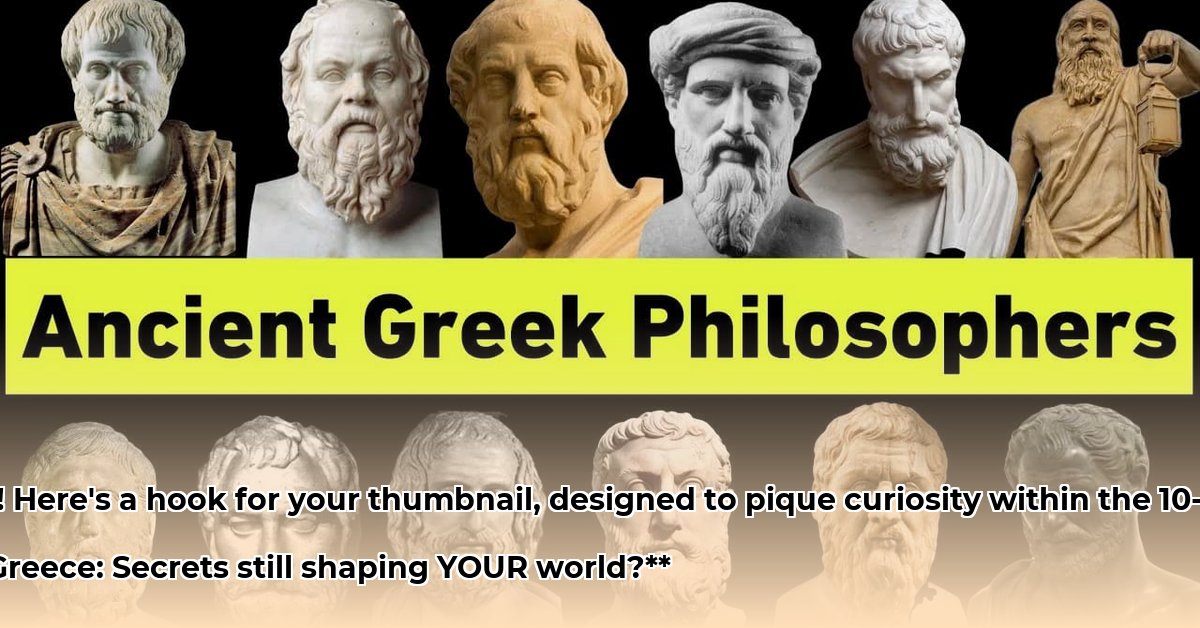



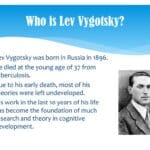
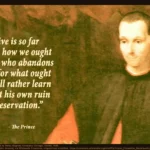

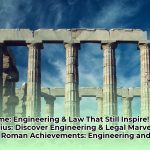
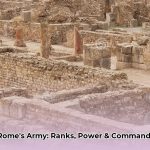
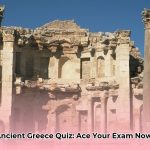


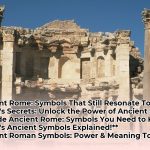
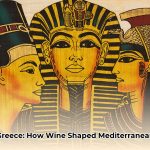
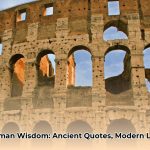

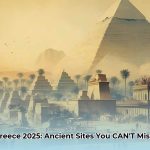
1 thought on “Unlock Wisdom: Main Philosophers of Ancient Greece Guide Theories & Modern Relevance Unveiled”
Comments are closed.